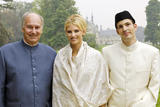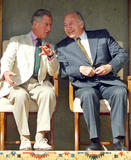Do business and Islam mix? Yes, if you are the Aga Khan - By G. PASCAL ZACHARY
He has poured money into poorer, neglected parts of the world, often into businesses as basic as making fish nets, plastic bags and matches, while also teaming up with private equity powerhouses like the Blackstone Group on a huge US$750 million hydroelectric system in Uganda.
And as he tries to present a less threatening face of Islam on the global business stage during a time of war, the Aga Khan - one of the world's wealthiest Muslim investors - preaches the ethical acquisition and use of wealth and financial aid that promotes economic self-reliance among developing countries and their poorest people.
In a rare interview, the Aga Khan, who is chairman of the Aga Khan Fund for Economic Development, a for-profit company based in Geneva, says he is more concerned with the long-term outcomes of his investments than with short-term profits. Rather than fretting daily over the bottom line, he says, he tries to ensure that his businesses become self-sustaining and achieve stability, which he defines as "operational break-even," within a "logical time frame."
 |
| The Aga Khan, left, poses with his son and daughter-in-law, Sept. 17, 2006, in Chantilly, northern Paris. PHOTO: AFP |
 |
| A classroom at the University of Central Asia, Kazakhstan, founded by the Aga Khan. PHOTO: NY TIMES NEWS SERVICE |
Economic developments experts say the Aga Khan's activities offer a useful template for others - including philanthropists like Bill Gates and George Soros - who are trying to assist the world's poorest by marrying business practices to social goals, but whose foundation work usually stops short of owning businesses outright in poor countries.
 |
| The Aga Khan, left, congratulates graduates of a midwife training course in Afghanistan that was sponsored by the Aga Khan Development Network. PHOTO: NY TIMES NEWS SERVICE |




2 Comments:
Hello,
Thank you for the article. You said you spoke directly to the Aga Khan by phone?
Thank you
click on the heading to read the article in full
it is not mine:)
Post a Comment
<< Home